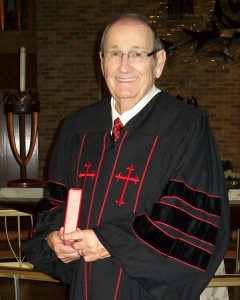
When the great Norwegian violinist “Ole Bill” was giving a concert in Parish, the “A” string of his violin snapped. This great musician was not to be outdone, so he kept playing, transposing the composition for three strings as he played. He finished the concert in a beautiful way with three strings.
As life gets more and more complicated, most of us know all about a “string that snaps”. It may come in the form of an unexpected illness, a sudden death, the loss of a job, a relationship gone sour, or any number of losses or abuses. Then, we realize that life moves on with or without us. While the music of life keeps playing, some of us may be sitting in the corner wishing the “string” hadn’t broken, and throwing ourselves a pity party. “If only this had not happened. If only that…” is the game we play.
Losses are usually heartbreaking, but it’s not only what we have lost, rather, what we have left that really counts. This attitude has made it possible for many people who have setback and broken dreams to keep going. Anyone can give up; it takes a special person to say, “I will keep doing the best I can, regardless of this loss.” This was certainly true about the Apostle Paul, who was shipwrecked, imprisoned, beaten, run out of town, and was a victim of other abuses. Yet, he said, “I can do all things through Him who gives me strength” (Philippians 4:13).
Did you know that in the Roman catacombs, Christ is pictured as a “sceptered dolphin”? “Why,” I asked the tour guide, “is a dolphin a symbol of Christ?” His answer: “Because they can lead a ship to the harbor, and large dolphins can keep the sharks away.” The message of Christ can lead us in our darkest hour. It’s a very appropriate symbol.
It is said that we really don’t know God until we suffer and call out for help. Suffering has changed many people—for in the end, absolutely nothing can separate us from God’s love and forgiveness. We are, in this life and the next, in the hands of one safer and gentler than our own.
A friend approached me recently with the question, “Do you think I’ll go to Heaven when I die?” I reminded her that this was not in my department, but from all indications, she was a saintly woman who had live and good life, and that she, like everyone else, had made her share of mistakes, but God’s love was greater than any of our sins. “While we are yet sinners, Christ died for us,” is the gospel message.
Fr. Ron Rolheiser, president of the Oblate School of Theology in San Antonio, put it this way: “For God is not a God of punishment, but a God of forgiveness. God is not a God who keeps records of our sins, but God who washes them away. God is not a God who demands perfection from us, but a God who asks for a contrite heart when we can’t measure up. God is not a God who gives us only one chance, but a God who gives us infinite chances.” God is not a God who waits for us to come to our senses when the string snaps, but a God who ist here calling out for us to keep playing. Anyone can give up, as I said, but it takes a strong person to hang in there and still have the joy of life.
After my first retirement, I decided to put fruit trees in our backyard. I drove to Clyde Holloway’s nursery in Forest Hill, and I was met by an elderly gentleman named Mr. Raspberry. I asked about fig trees, and he said the winter killed them. But he said he had plenty of other fruit trees—satsuma, lemon and so on. As we were walking in the nursery, he started humming. “Hmmmm, hmm,” and I interrupted, “Mr. Raspberry, you must sing in the choir.” “Oh, yes sir, I sing every Sunday,” he responded, and he kept on humming. “I’m a preacher,” I said. “I knew you was something,” he laughed. In a few moments, he stopped, and with a serious tone in his voice, he continued, “Reverend, I’ve got troubles; I’ve got bad troubles, and the doctor told me I don’t have long to live.” And then, a smile came over his face. “But the Good Lord said, ‘It don’t matter, you can still sing, can’t you?’,” he beamed. Then, Mr. Raspberry started singing in a low voice, “Lord, take my troubles, and lay ‘em down…Lord take my sorrows and lay ‘em down, for when I cross over Jordan, I won’t have a burden, cause the Lord took my troubles and laid ‘em down. For the Lord said, ‘It don’t matter. You can still sing, can’t you? Coming for to carry me home’. Amen.”
“For absolutely nothing can separate us from the love and forgiveness of God. Amen.”









